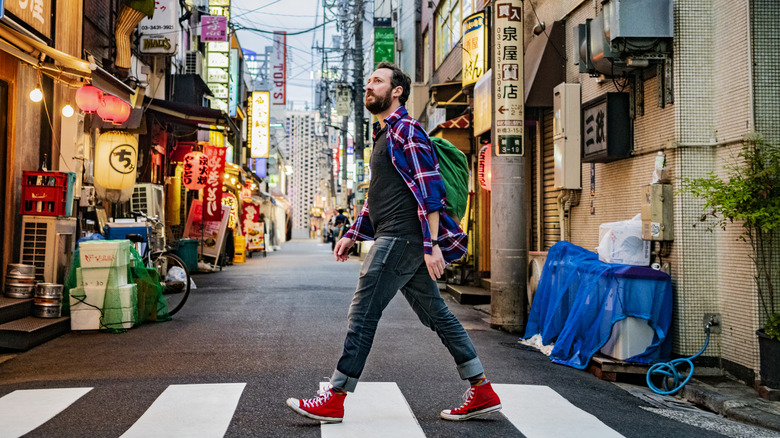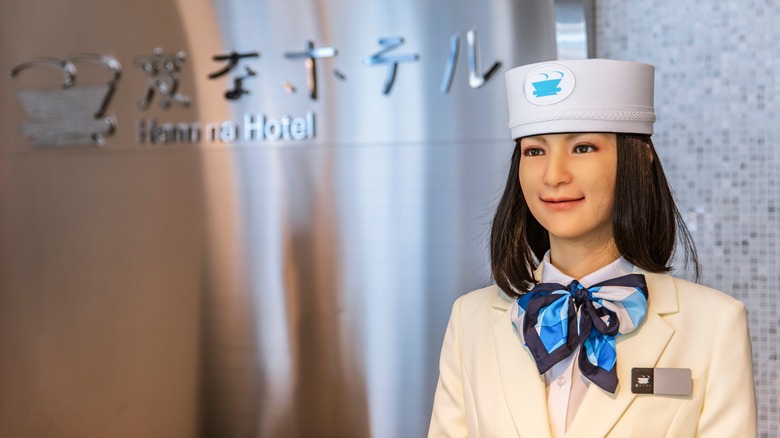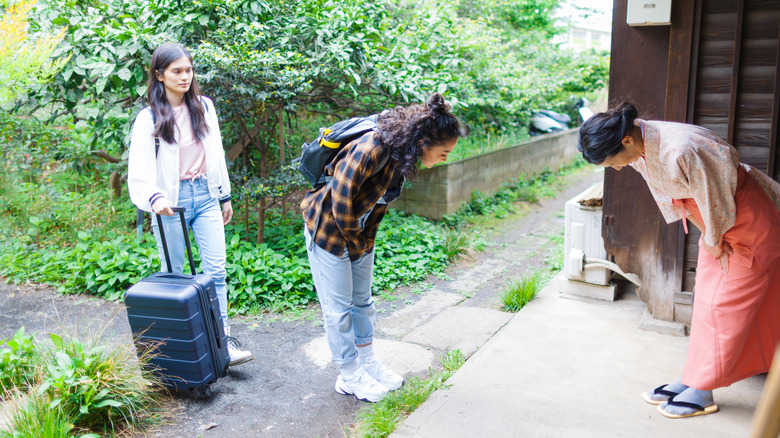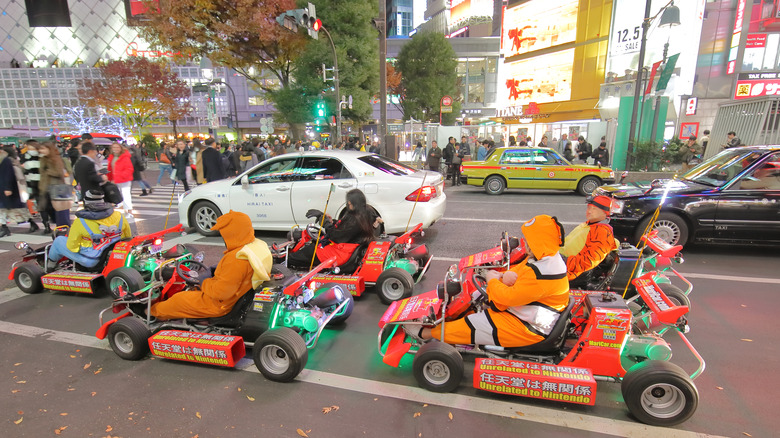Everything Travel Influencers Keep Getting Wrong About Japan
Thanks to a boom in post-pandemic tourism, Japan travel content is everywhere, encouraging scrollers to book a flight to the home of Godzilla and Pikachu. And while that content can be a good source of inspiration when planning a trip, there's one thing you should know: Travel influencers get a lot of details wrong about the East Asian country. That doesn't mean the pro-Japan videos and blog posts are entirely deluded. As someone who spent over seven years living in Japan, I'll be the first to say it's one of my favorite places on the planet, and Tokyo is still the benchmark I compare other destinations to. Clean streets, some of the most beautiful temples in the world, quiet train cars, gourmet-quality food at a reasonable price — what's not to love?
With that said, not everything is as it appears, especially when made into a 15-second clip on TikTok or summarized in 125 characters in an Instagram post. Travel influencers and content creators tend to perpetuate the same tired stereotypes about Japan, such as that it's futuristic, the people have perfect manners, or that the culture is just plain weird. In reality, there's a lot more to the Land of the Rising Sun than social media would lead you to believe, and much of the most viral content doesn't accurately reflect Japanese culture or society.
No, Japan isn't 'living in the year 2050'
If there's one tagline that travel influencers love to slap on their Japan vacation content, it's the phrase "Japan is living in 2050." YouTuber Drew Binsky made a video about how futuristic Japan is, citing evidence such as a Japanese hotel manned by robot staff and fast bullet trains. On TikTok, @nickandhelmi posted a video with "proof that Japan is living in 2050," including machine beer dispensers and screens placed next to urinals in a public restroom. Countless other examples can be found on just about every social media platform. But, if you ask me, they're nothing more than sensationalized clickbait.
Spend more time in Japan and you'll quickly see how old-fashioned the country really is. Fax machines are still an office mainstay, traditional ink stamps are used when a document needs signing, and most business still gets done in person and not digitally. Not to mention norms such as gender roles and workplace hierarchies are still largely rooted in traditional views, even if they don't always agree with contemporary realities.
Of course, these cultural attributes likely won't impact you much if you're only visiting Japan for a short time. But even as a tourist, seeing beyond the "futuristic" label will help you experience a more authentic side of Japan. The reality is most locals don't regularly interact with robots or take the bullet train to work. Instead, they relax with friends at izakayas or ride a bicycle to get around their neighborhoods. Trying these not-so-futuristic customs during your trip can help you get a better feel for the true Japanese lifestyle.
Japanese politeness can be complex
It's not a stretch to call Japanese people polite. But, like many things on social media, this aspect of Japanese culture can be oversimplified when highlighted in a viral post. For example, travel TikTokers @hudsonandemily shared a clip showing how polite Japanese people are because they stand on one side of the escalator so others can pass (a practice in many cities around the world). And if you look up content about visiting Nara, you'll quickly find photos and videos talking about how "polite" the bowing deer are, as if they've been influenced by the polite humans around them.
However, expecting Japanese people to be polite can lead to confirmation bias. This isn't a bad thing, necessarily, but it can warp your view of the country and people's intentions. For instance, @kebmanalac shared a TikTok video captioned "Japanese people are really the nicest," though the clip only showed a group of young women grabbing a cap off of someone's head and proceeding to start a conversation (something that, for what it's worth, is rare in Japan). People may make small talk in other countries, too, but it seems to be exaggerated when it occurs during a trip to Japan.
Even when people are being polite, there are often complex cultural reasons for their behavior. One is the concept of "tatemae," or the courteous exterior Japanese people generally display in public (while one's real feelings, or "honne," are kept hidden). Another is "wa," which translates roughly to "harmony," a social cornerstone that can make standing out of line or talking loudly on a train feel terribly embarrassing to Japanese people.
Japan isn't any weirder than your home country
Maid cafes, ramen topped with ice cream, Mario Kart-style go-karts on the roads of Tokyo, a museum devoted to poop... To outsiders, and particularly Western tourists, it's easy to label Japan "weird" and "crazy" and call it a day. And a lot of influencers and content creators have done just that, including YouTuber Lost LeBlanc, Bloggers Thrifty Nomads, and @loulouexplores on TikTok. However, a lot of the oddities found in Japan are created to draw attention (check) and attract tourists (check). If they're intended for the locals at all, it's often only a niche group of people.
Still, you could argue that Japan really is just as weird as it seems online because of everyday things like cutesy character mascots, wacky TV game shows, toilets that play music, or raw eggs on restaurant menus. These are all things that are enjoyed by local Japanese people, and not just tourists — but they still aren't proof that Japan is "weird." Rather, they're simply different from what you may be used to.
In my opinion, it's crucial to visit Japan with an awareness of any Eurocentric or Americentric beliefs you may have been taught. This can be easier said than done, but one place to start is by replacing judgments like "weird" with words such as "different" or "interesting." This encourages curiosity so you can find out why kawaii characters are so common or how people in Japan eat raw egg without getting sick (for the record, there are actual explanations for both). And just think: Japanese people visiting your home country might think it's a pretty weird place too.



